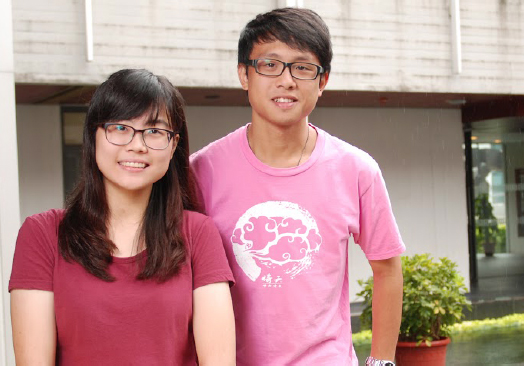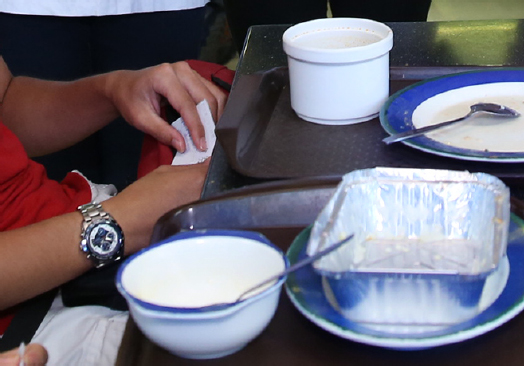
Greenest O'Campers Share Their Thoughts
Walker Chau Ka-chun and Winnie Ho Yuen-ching, two organizers from the winning team from the Department of Chinese Language and Literature of the 2014 Greenest O-Camp Competition.
What made you take part in the competition?
Walker: The University was sponsoring reusable water bottles and one of the prerequisites to having that sponsorship, was committing to fulfil green actions required for the Greenest O’ Camp Award. That was how it all started. We wanted the sponsorship.
Why did you think you won?
We were supposed to fulfil at least seven out of 15 green actions, including two mandatory actions: one that forbid water flinging and one that involved communicating a Powerpoint to the freshmen that encouraged them to bring their own bottles and use water dispensers on campus. We completed a total of 13 actions in the end. These included, for example, asking the freshmen to separate their recyclable waste and dispose of them in recycling bins; accepting as few sponsored items, such as toothpaste and shampoo, as possible unless they were necessary.
Did you encounter any obstacles?
Winnie: The reusable water bottles were meant for freshmen only, not for the upperclassmen who volunteered to help out. Some of the latter were expecting to be given them, so they were a tad disappointed, but they soon got over it.
Walker: One challenge was related to dining. We had to give the canteen instructions not to prepare any disposable cutlery and to make sure that the 200-odd freshmen all brought their own eating utensils. We also wanted to minimize food waste so we had to make a guess how much food was needed, by factoring in the girls' possibly smaller appetites and the fact that some participants might not show up. It was difficult because we didn't want anyone to go without food either. All this had to be done before the O-Camp. Everything turned out well in the end. We were glad to see the students all brought their own cutlery.

Anything you'd like to share with us about the experience?
Winnie: The more we became involved in being green, the further we wanted to go. One green action was encouraging the students to take the stairs instead of the lifts. We went a step further and had them navigate the campus on foot rather than take the school buses. One time, they walked from the Yasumoto International Academic Park to United College. It's not a short distance. I admit it might have been a little tough for some of the students.
Walker: We wanted to save money by not booking school buses, but importantly, we thought we could do more for the environment just by investing a little time and effort, so why not?
Winnie: We bought bread and snacks for the students. There was some left at the end of the O-Camp and we donated it to a food bank, and asked hungry students to take what they wanted. That too was not on the list of Green Actions.

Did the experience offer any new insights?
Walker: It's not that difficult to be environmentally friendly, if you have the right mindset and keep your eyes open. For example, recycle bins are prevalent on campus if you look out for them. Once you get into the habit of separating your waste, it becomes natural.
Winnie: As the organizers, we could see our influence on the participants. Doing one more green action, or going further with one, may require very little from us, but could lead to behavioural change among a group of people. We will bring what we learnt from O-Camp to events we organize in the future.
Walker: I think we won't even take the University's water bottles next year as it is safe to assume that everyone has one. We will just ask participants to bring their own. I think the University should encourage the other o-camps to carry out these Green Actions.
Were you environmentally conscious before this O-Camp?
Walker: I was a little, as I learnt about the state of the environment in geography classes in secondary school. Completing the Green Actions gave me a great sense of fulfilment.
Winnie: I have been recycling waste for some years now. When I see the visible signs of environmental degradation, I feel it's not enough just to care, but to put your concern into action.
How will you use your prize of $3000 worth of book coupons?
Winnie: Share them among the 40 odd organizers. We didn't expect to win.


